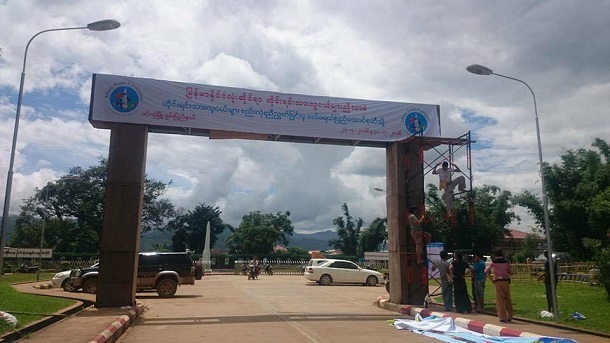The organizers of a National Ethnic Youth Conference to be held in the Shan State town of Panglong are planning to defy an order from the state government to “suspend” the event.
On Monday, the organizers received a letter signed by Aung Than Maung, the Burman ethnic affairs minister in the Shan State government, stating that the conference could not go ahead as planned, according to an “order” from the Union government.
The conference organizers claim no reason was given for the suspension order, and the letter did not state when in fact the conference could take place.
In statements released on Facebook, and in comments made to The Irrawaddy, the various groups taking part have signaled their intention to go ahead with the conference, planned for July 27-31, in spite of the suspension order.
More than half of the youth delegates—set to number more than 600—have already arrived in the town. The rest are reportedly on their way.
Panglong, in Loilen District of southern Shan State, was the site of the Panglong Agreement reached in 1947 between Burmese independence leader Gen Aung San and leaders representing the Shan, Kachin and Chin ethnic groups. The agreement promised equal rights and full autonomy in internal administration for the “frontier areas”—the borderlands where ethnic minorities predominate.
Sai Aung Myint Oo, a conference organizer, told The Irrawaddy, “We will go ahead and hold it because we have the right to do so, even under the 2008 Constitution.”
“The government should be supporting us, but the state government dares not take responsibility and the Shan State chief minister is avoiding meeting us,” he said.
Through multiple statements delivered chiefly through social media, supporters of the conference initiative—including educators, political analysts, activists and politicians—have objected to the suspension order from the Shan State government.
Kyaw Min Htike, who leads an ethnic Dawei youth delegation to the conference—currently traveling all the way from Tenasserim Division in Burma’s far south—told The Irrawaddy that they “condemn the government’s act,” and will continue on to Panglong regardless.
“It is ugly,” Kyaw Min Htike said. “[This] should never have happened under the government that promised change.”
Youth from Burma’s ethnic minority regions began preparing for the conference four years ago, and held a preparatory ethnic youth conference in northern Shan State in 2014.
“The government’s objection [to the youth conference] shows its lack of vision,” said Sai Nyunt Lwin, secretary of the Shan Nationalities League for Democracy, the second largest party in the Shan State parliament after the Union Solidarity and Development Party.
He has encouraged the youth taking part to “calmly overcome” the challenges and to demonstrate solidarity by making a “collective decision.”
“The new government need not be fearful,” Sai Nyunt Lwin added. “What are they afraid of?”
On Tuesday afternoon, the conference organizers went to the Shan State capital of Taunggyi to request talks with the state government.
Late afternoon on Tuesday, one of the organizers, Mai Mai, informed The Irrawaddy that a government official [whose rank and identity they wished to keep anonymous] had told them that they now had permission to proceed with the conference—a seeming reversal. However, as of 5:30 pm on Tuesday, they had not received official confirmation.

















